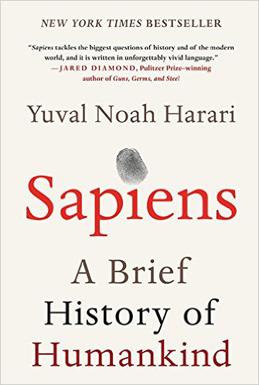The most thought-provoking book I’ve read since Peter Watson’s “Ideas”, Yuval Noah Harari’s “Sapiens: A Brief History of Humankind” delivers on its title. As with that previous tome, I first intended to make notes on amusing tidbits, but then I would simply end up transcribing the book, so what’s the point? Read it for yourself.

I was particularly knocked about by the chapter on the Agricultural Revolution: it had never occurred to me that maybe plants aren’t controlled by humans to OUR benefit, but that humans may be controlled by plants to THEIR benefit. Harari misses some points for a few far-fetched extrapolations and overly tongue-in-cheek photo-captions, (leave those to blogs like this one!). “Sapiens” also contains some provocative opinions, so if you LIKE to get upset at other people’s diverging opinions, this might be the book for you! The more informed reader will find it an amusing, ambitious recap of where we are as a species, while making minor objections to points here and there. As for the younger reader, I couldn’t recommend this more: an engaging, mind-blowing run though millennia of human history that should be read by all.
One concept that I do want to expound on is Harari’s description of the inter-subjective, because I imagine most adults understand “objective” and “subjective,” but I don’t think enough of us are aware that most of the time when we say “subjective,” we actually mean “inter-subjective.”
OBJECTIVE: Average temperatures across the globe are rising. This is a REAL THING. It is MEASURABLE. Temperatures that had remained more-or-less stable through their recording by humans are rising exponentially, at least partly if not largely due to human behavior, and this has negative repercussions for humanity. Whether people are aware of it or not, it doesn’t matter, because the phenomenon is real and still takes place.
Answer to the age-old riddle: “If a tree falls and no one hears it, does it make a sound?” YES. It made a sound because the fall established in the premise caused a vibration in the air, which is how sounds are made. No human heard the sound, fine. It’s doubtful that no animal or bird heard that sound, considering how forests work, but ok. The fact is, the sound was created, even if no one was close enough to perceive it. “If global warming happens, and a single human can’t perceive it happening, does it still have consequences?” YES YES YES.
SUBJECTIVE: “I don’t feel hot. It’s Christmas and I’m in Fargo, Minnesota, and it snowed just fine.” That’s one person’s limited reaction, based on that person’s experience. I don’t find much wrong with this. We’re all ignorant of an endless variety of phenomena. Typically when exposed to an object, idea or experience, we learn about it and are changed by it, unless we have some powerful personal investment on denial or delusion, or there’s some developmental issue that make us resist new information.
The problems (and solutions) of society lie with the Inter-Subjective:
INTER-SUBJECTIVE:
“Global warming is a hoax by liberal eco-terrorists that have somehow involved climate scientists all over the world in their fight against profitable industries, specifically the oil industry; it will ultimately come to nothing.”
Or its converse:
“Global warming is a real imminent threat, caused by a conservative coalition of evil corporations that don’t care if they destroy the planet in their psychotic quest for profit; we must fight against it with all our might or the human race will face a horrific end.”
Both inter-subjective myths have ‘some’ connection to the initial objective fact, but they’re also limited distortions of reality; they’re dogmas, -isms, myths, memes in their shortest form. Their “reality” is of no relevance. What matters is that they can connect large networks of people and unite them in one behavioral path.
Intersubjective ideas emerge from one authoritative source and spread widely to a network of consciousness. Changing them is nearly impossible from outside that network, because there’s usually too much of our identities at stake in our position within a group. But they can adapt with time- slowly and with some resistance- if enough members of the network that share it agree to adapt. Both of the inter-subjective mind-sets above have faced changes:
“Ok, fine, maybe global warming it’s real, but that doesn’t mean it is man-made. We can’t control that!” And then: “Ok, fine, maybe mankind does affect the environment, but so what? ‘Civilization is but a small break between Ice Ages’ and all that. Why disrupt our society and economy when humanity is doomed no matter what?”
As for its converse:
“Ok, fine, maybe we have limited control over weather patterns and there’s not that much we can do stop it, but we at least have to reduce our carbon footprint, or we will all die!” And then: “Ok, fine, we’re all gonna die anyway, but what about our children’s children?” And then: “Oh, ok fine, they’ll all die too, because eventually the global warming will be over and we will have an equally deadly global cooling, and anyway the sun will exhaust itself at some point so the only true hope for your children’s children’s children’s is to escape out of the Solar System and inhabit another galaxy and…”
Etc etc etc.
Here are other inter-subjective concepts:
“We have to do something! We are the stewards of the planet!”
“We don’t have to do anything! We’re a dumb arrogant species that deserves to be knocked down a peg! The dinosaurs didn’t have to do anything about climate change; why should we? What makes us think we’re better than dinosaurs?”
These ideas may have originated “subjectively” in hypothetical personalities within my head, but they’re very adaptable as “inter-subjective” ideas because there’s nothing about them that makes them “me”-centered. Either one of them may easily match YOUR personal philosophy- or both, if you’re as weird as me.
Inter-subjective concepts may be “falsehoods” but they are at the roots of community, society, civilization. None of these is possible without inter-subjectiveness. “Law, money, gods, countries,” are Harari’s examples. I would add “art” and “love,” two illusions to which I happily subscribe. They have no real “truth” outside of their usage by a group. If the group co-operates without dissent, they become entirely truthful and meaningful to THAT group, because they create a sense of drive and purpose. It is up to our collective human judgment to be FLEXIBLE with our shared lies, so that these concepts can be helpful social inspirations, and not crushing, tyrannical delusions.
RATING: MASTERPIECE!!!
Advertisements Share this:




